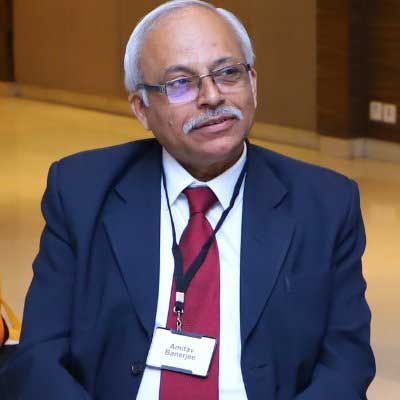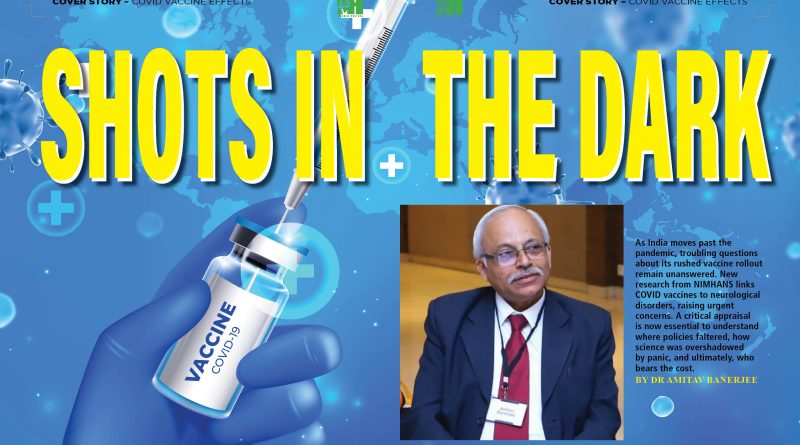Shots in the Dark
 As India moves past the pandemic, troubling questions about its rushed vaccine rollout remain unanswered. New research from NIMHANS links COVID vaccines to neurological disorders, raising urgent concerns. A critical appraisal is now essential to understand where policies faltered, how science was overshadowed by panic, and ultimately, who bears the cost.
As India moves past the pandemic, troubling questions about its rushed vaccine rollout remain unanswered. New research from NIMHANS links COVID vaccines to neurological disorders, raising urgent concerns. A critical appraisal is now essential to understand where policies faltered, how science was overshadowed by panic, and ultimately, who bears the cost.
By Dr Amitav Banerjee
One of the most contentious issues in the public space is concerns around the adverse effects of the Covid-19 vaccines, which were rolled out hastily on a mass scale during the pandemic. These apprehensions may have been allayed to a certain extent by an Indian Council of Medical Research (ICMR) study giving a clean chit to the vaccines, though some critics have expressed concerns about the flaws in the hastily conducted study. Public panic was stoked recently when the Chief Minister of Karnataka linked sudden deaths to the Covid-19 vaccines. People rushed to hospitals for cardiac checks. While experts, who were asked to investigate, hastily tried to douse the fire by citing quickly assembled data—including the far-from-perfect ICMR study—recent reports from the National Institute of Mental Health and Neurological Disorders (NIMHANS), Bengaluru, have linked a number of nervous system disorders to the Covid vaccines. The NIMHANS has recommended detailed studies. The jury is still out on the safety of the Covid-19 vaccines.
Was Mass Vaccination in Our Country, Given Our Young Low-Risk Population, Justified?
At this stage, many would consider this question at best of academic interest or at worst a criticism of policy. However, as mentioned at the outset, we should introspect and identify our errors to learn from them so as not to repeat them in future pandemics.
Given the low lethality of the virus in the healthy and young—around 0.0003 per cent up to the age of 19 years and around 0.03 to 0.07 per cent up to the age of 69 years (around 95 per cent of our population is below 70 years)—we may concede that panic prevailed over science in rolling out mass vaccination in unholy haste. Making matters more complex, the Indian population for the most part received Covishield (AstraZeneca), which was paused in several European countries for those below 50 years of age due to concerns about clotting disorders, albeit rare. Around 85 per cent of our population is below 50 years. Consequently, even if adverse events are rare, the absolute numbers of those who suffer vaccine injuries can be considerable. Covishield was certainly not the appropriate and safe vaccine for our young population, if at all mass vaccination was indicated.
Large-scale, hurriedly rolled-out vaccination in our population was also infructuous and unsafe, given the fact that in June 2021, serosurveys conducted by the ICMR showed that 68 per cent of Indians had antibodies. Around this time, less than 5 per cent of our population had taken two doses, and less than 20 per cent had taken one. In some heavily congested cities like Ahmedabad and Delhi, the seropositivity rates were close to 80 per cent. Studies by this time had established that the immunity conferred by natural infection is 13 to 26 times more robust than vaccine-induced immunity.

Were Early Red Flags Ignored?
In a column titled “Covid-19: What Explains the Sudden Deaths?” in The National Herald, dated 23 December 2022, an experienced epidemiologist, along with a professor from IIT Bombay and a data scientist, after studying patterns from India and all parts of the globe, raised concerns on reports of otherwise healthy young people collapsing and dying and recommended proper follow-up studies of the vaccinated and the unvaccinated to identify adverse effects of the vaccines, if any. This should have been possible given our digital Cowin portal, which captured the vaccination details of over 100 crore Indians.
These two researchers brought to attention a spike in cases of sudden heart attacks, cardiac arrests and other cardiac complications among all age groups in the country, with seemingly fit people dying of heart issues while walking on the street, on the dance floor and even while just sitting at a desk. Keeping a detached view, and not jumping to conclusions, they conceded that the sudden and unfortunate deaths in previously healthy people, including teenagers, may be purely coincidental. But it was emphasised in the column that such incidents demand attention and a precautionary reflex—to err on the side of caution.
To substantiate their claims for robust studies to establish the safety of the vaccines, the column in the National Herald narrated quick and dirty evidence from social community platforms like LocalCircles, which did an impromptu survey bringing out that 51 per cent of people knew someone who had sudden death from strokes, heart attacks, etc. in the recent past: out of these, 62 per cent were double vaccinated, 11 per cent had received a single dose, and 8 per cent were unvaccinated.

Science demands a detached view and scientists should not jump to conclusions. One of the requirements for this is discerning any unusual patterns at the population level. This did indicate some cause for concern as brought out in the column with supporting data from around the world. The increase in sudden deaths had been reported since early 2021; there was a six-fold increase in heart attacks reported from Mumbai. The pattern of excess deaths is not however restricted to India, but is global.
The case of Australia is even starker, as the country followed a zero-Covid policy for a long time, with strict lockdowns as well as coercion and mandates for Covid-19 vaccines. By the start of 2022, it had vaccinated the majority of its population and even booster doses were made available.
The baseline average deaths in the first eight months of the year were just 110,483 while the total deaths in the first eight months of 2022 were 129,513. This represents a 17.2 per cent increase in deaths in Australia, above the baseline.
Edward Dowd in his book, Cause Unknown—The Epidemic of Sudden Deaths in 2021 and 2022, reports an 84 per cent rise in sudden deaths in the age group 25–44 years in USA, coinciding with mass vaccine mandates which was corroborated by a study of insurance claims.
There are two possible causes for the high excess mortality world-wide. First, these could be the prolonged effects of harsh lockdowns. After all, lockdowns have directly increased diabetes, obesity, starvation, poverty, joblessness, vitamin-D deficiency, propensity for cancer, etc. A second cause could be the excessive use of Covid-19 vaccines, even among the already Covid-recovered, and even among the not-at-risk population, without adequate safety data.
The authors of the column in the National Herald had concluded that the time correlation of heart illnesses with the Covid-19 jab rollout is unmistakable in the worldwide data. While correlation does not mean causation, it certainly is a red flag which must be probed objectively, they concluded.
How Robust Is the ICMR Study Giving a Clean Chit to the Vaccines?
The highest level of evidence in evidence-based medicine is the Randomised Controlled Trials (RCTs). We presume that RCTs may have been initiated in the interim while the vaccines were thrown open to the masses under Emergency Use Authorisation (EUA). After five years, the public deserves access to the results of these RCTs.
The second level of evidence is the cohort studies, i.e. following forward groups of people and comparing the outcomes in the different groups. For studying the impact of the vaccines, a group of vaccinated and a group of unvaccinated should have been followed forward in time to ascertain the different outcomes in each group. This monitoring should have been in place from the moment the vaccines were rolled out. Even at this belated stage, this data can be retrieved from our digital Cowin portal.
Instead of resorting to robust studies at the upper echelon of evidence-based medicine, the ICMR for some strange reasons did a hasty case control study which is low down in the hierarchy of evidence-based medicine.
The study background of the ICMR study is misleading. It starts with the sentence, “…anecdotal reports of sudden unexplained deaths…” If the researchers of the ICMR study had cared to study the national and global data thoroughly they should have discerned the patterns of these sudden deaths and their relation with population level vaccine rollouts, and would have not termed it “anecdotal.”
The jumbo type study with over 47 tertiary care hospitals and almost 100 plus authors, with a weak study design and methods, was doomed to fail to reach any conclusion regarding the safety of the vaccines. The quality of the study leaves much to be desired. As expected, the study failed to find any association between the vaccine and sudden deaths, and for good measure even concluded that the vaccines prevented such events!
They compared 729 cases of sudden deaths with 2916 controls. The weakest link in the study is the choice of controls which were from the same neighbourhood as the cases. This overmatching in the exposure variable, vaccine in this study, ensured that there were almost equal proportion of vaccinated among the cases and the controls. In a case control study this overmatching would efface the association of the vaccine with the sudden deaths, even if it is present. Once this association is suppressed by this design selected by omission or commission, other factors such as family history, recreational drugs, binge drinking, vigorous physical activity and other well-known risk factors will show strong association and mislead the reader.
To illustrate with another example on how a choice of faulty controls in a case control study can mask an association and even show that something harmful can be protective. Suppose if in a case control study to find the association of alcohol and cirrhosis of the liver, we take cases as patients with cirrhosis and take controls patients admitted in the orthopaedic ward after road traffic accidents. If we take history of consumption of alcohol from the cases and controls we may find that alcohol protects one from getting liver cirrhosis since it is more likely that people who drink are more prone to road traffic accidents! Here the suspected agent under study, i.e. alcohol was overmatched in both the cases and controls, like the exposure agent under study in the ICMR investigation, the vaccine was overmatched both in the cases and controls being from the same neighbourhood. And regarding the finding of the ICMR study showing vaccine to be protective from sudden deaths can be attributed to the fact that firstly, many sick people avoid taking the vaccine, and secondly, some may have not taken the second dose after experiencing adverse effects from the first dose which explains why only taking two doses was protective in the ICMR study.
The failure to find any association and on the other hand finding vaccine protective from sudden deaths can be due to faulty study design mainly inappropriate choice of controls.
Besides this basic fundamental flaw in the study design, there are other errors such as figures in the tables do not match at places and so on.
The ICMR study was published in the October 2023 issue of the Indian Journal of Medical Research. The glaring flaws in the ICMR study was communicated to the journal by way of two correspondences by independent observers which were published in the November-December 2023, and January 2024 issues of the journal. Though the authors of the ICMR study have responded to the queries regarding the flaws in the study, the reader can examine them and come to their own conclusions as to the rigor of the ICMR study which gave a clean chit to the vaccines. It is also a matter of surprise that researchers from an august body like the ICMR did not have access to the vaccination data which have been captured on digital platform as stated by them in their response to the queries of the critics.
The Way Forward
Public trust will be lost by sloppy studies such as the one carried out by ICMR and that too after much delay. Given the experimental and emergency use authorisation of the vaccines, there should have been continuous monitoring forward of the vaccinated along with comparative monitoring of events in the unvaccinated. In a large country like India, even if 3-5 per cent had remained unvaccinated there would have been crores of unvaccinated controls for comparison. The recent findings by NIMHANS Bengaluru of possible association between the vaccine and neurological disorders make the cause for proper long term follow up studies stronger. And preferably these studies should be conducted by parties with no conflicts of interest.
It would also be relevant to remember that the manufacturer had withdrawn AstraZeneca (Covishield in India) because of concerns of clotting disorders when facing lawsuits in the UK court. Desperately trying to declare the vaccine safe by ill-designed studies, in light of this is dereliction of responsibility.
Sadly, whether it is tragic air accidents due to mechanical fault in airliners or tragic deaths of young person due to hastily rolled out vaccines, commercial interests and strong lobbies seem to prevail by victim blaming on basis of shoddy investigations, instead of thorough unbiased studies. At stake are human lives in both situations.
(A renowned epidemiologist, the author is Professor Emeritus at Dr DY Patil Medical College, Pune, and ranked among Stanford’s top 2% global scientists (2023–24). Founder of Universal Health Organization (uho.org.in), he wrote Covid-19 Pandemic: A Third Eye.)

